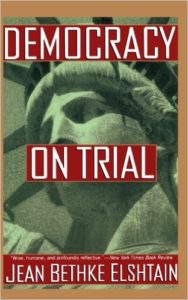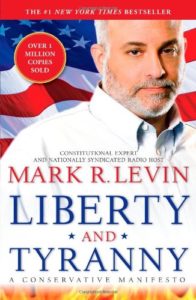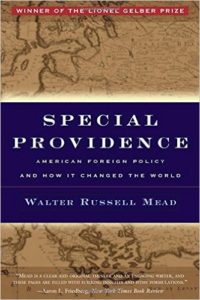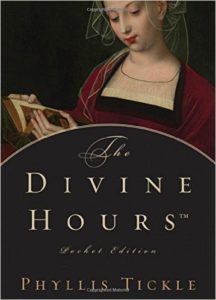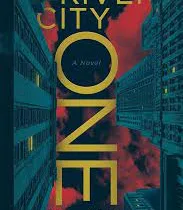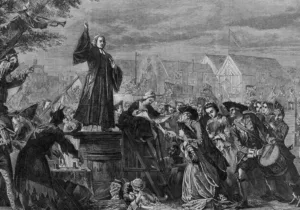Believing that few other material gifts bring the “Merry” to Christmas quite like a good book (though a lasagna is a contender) I asked some of our contributors, editors, and friends to recommend top reads that ought to land in the stocking or beneath the tree of Christian readers interested in foreign policy, national security, military ethics, etc–the ideas on which Providence centers. They needn’t focus necessarily on foreign policy issues, strictly speaking. History, biography, ethics, theology, memoir, poetry, fiction, and any of a range of other subjects were fair game. I encouraged writers to feel at liberty to recommend their own books. So if you’ve a last minute need for a biblio-gift, fire up your Amazon Prime account and make merry. Alternatively, what better time to nestle into a comfortable chair with some reading of your own? In either case: enjoy!
Joe Capizzi
Augustine, City of God: Fascinating on many levels, including as a work of historical construction, Augustine’s reflections on the essential elements of a true republic, on glory and honor, and on Christian citizenship are necessary for anyone trying to think about the limits and possibilities of earthly cities.
Mark Helprin, A Soldier of the Great War: A beautiful, fun, and thrilling book about beauty itself. In my judgment, Helprin never has equaled his writing here and in Winter’s Tale. The story is set immediately after WWI, and tells the tale retrospectively of the fantastic exploits of Alessandro Giuliani, a professor of aesthetics. Soldier of the Great War is beautiful, absurd, and more importantly, a constant reflection on grace, love, and the spirit of man.
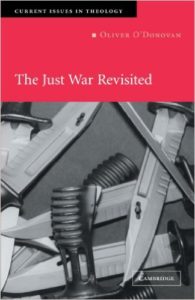 Oliver O’Donovan, The Just War, Revisited: I would recommend my own book, Politics, Justice, and War: Christian Governance and the Ethics of War, but Oliver’s is cheaper and shorter and written with his characteristic wit and insight. Oliver and I share the project of reclaiming a Christian view of politics that stretches back through Paul Ramsey, Grotius and the Spanish Scholastics, to Augustine. The goal is to show that the political act is ordered towards the end of politics: the creation and maintenance of as much “peace” as is possible at any moment. Less or more than that can never claim the mantle of “peacemaking,” no matter how apparently pacific the choice may appear.
Oliver O’Donovan, The Just War, Revisited: I would recommend my own book, Politics, Justice, and War: Christian Governance and the Ethics of War, but Oliver’s is cheaper and shorter and written with his characteristic wit and insight. Oliver and I share the project of reclaiming a Christian view of politics that stretches back through Paul Ramsey, Grotius and the Spanish Scholastics, to Augustine. The goal is to show that the political act is ordered towards the end of politics: the creation and maintenance of as much “peace” as is possible at any moment. Less or more than that can never claim the mantle of “peacemaking,” no matter how apparently pacific the choice may appear.
Joseph E. Capizzi is Professor of Moral Theology at the Catholic University of America. His latest book is Politics, Justice, and War: Christian Governance and the Ethics of Warfare.
——-
Alan Dowd
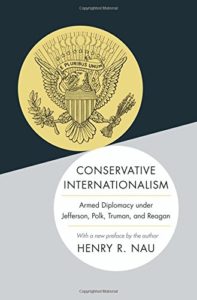 Henry Nau, Conservative Internationalism. Nau skilfully identifies and explains the major U.S. foreign policy traditions–nationalism, realism, liberal internationalism and conservative internationalism–and discusses each tradition’s most noteworthy practitioners. Then he describes why conservative internationalism–practiced by Jefferson, Polk, Truman and Reagan–is the most effective at promoting the national interest.
Henry Nau, Conservative Internationalism. Nau skilfully identifies and explains the major U.S. foreign policy traditions–nationalism, realism, liberal internationalism and conservative internationalism–and discusses each tradition’s most noteworthy practitioners. Then he describes why conservative internationalism–practiced by Jefferson, Polk, Truman and Reagan–is the most effective at promoting the national interest.
Derek Leebaert, The Fifty Year Wound. This essential history of the Cold War covers that crucial arc of history stretching from 1946 through 1991, with observations on how the institutions and systems of the Cold War continue to influence U.S. foreign policy even in the post-9/11 period. Leebaert adds layers of texture and background to the Cold War’s major milestones and decision points, which give these events new meaning and relevance. He also delves deep into the key figures of the Cold War, sometimes challenging the views we have of Cold War icons, sometimes forcing us to reevaluate the roles played by lesser-known figures.
Richard Reeves, Daring Young Men. This history of the Berlin Airlift is loaded with anecdotes, first-hand accounts and interviews that illustrate the heroism and creativity of the men who manned the airlift, the risks taken by the men who planned it, and the vast difference between the West and its Cold War foes. At a time when America seems to doubt itself–and when Western values are under assault–the book serves as a reminder that we in the West have been through far tougher times against far more threatening foes and yet have found a way to overcome those foes, defend our values and expand the community of peace-loving, free nations.
Alan Dowd is a senior fellow with the Sagamore Institute Center for America’s Purpose.
——-
Olivia Enos
The Black Book of Communism. It details the negative impacts of communism worldwide through a geographical and historical analysis of communist policies and their varying impacts on people all across the globe. I read it in undergrad and it completely shaped my desire to work on Asia – especially on human rights issues.
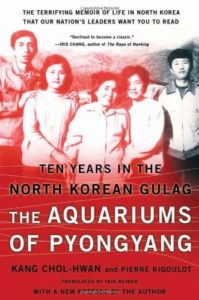 The Aquariums of Pyongyang. By far the best North Korean defector testimony I have ever read. Kang Chol-Hwan lived in a prison camp for 10 years, from age 9 to 19, and later escaped from North Korea. The story details the tragic loss of most of his family, the hardship he experienced prior to and during his time in the camp, and his ultimate decision to flee North Korea. It’s also an inspiring story because Mr. Kang now runs an organization to help North Korean refugees called the North Korea Strategy Center.
The Aquariums of Pyongyang. By far the best North Korean defector testimony I have ever read. Kang Chol-Hwan lived in a prison camp for 10 years, from age 9 to 19, and later escaped from North Korea. The story details the tragic loss of most of his family, the hardship he experienced prior to and during his time in the camp, and his ultimate decision to flee North Korea. It’s also an inspiring story because Mr. Kang now runs an organization to help North Korean refugees called the North Korea Strategy Center.
I think that Christians interested in foreign policy should read these books because 1) Christians should be familiar with history since our own faith is so historical itself and 2) because we need to understand the real hurting and pain that we are called to alleviate, and its causes so that we don’t repeat those mistakes again.
Olivia Enos, research associate in the Asian Studies Center at The Heritage Foundation, specializes in human rights and transnational criminal issues, including human trafficking and human smuggling, drug trafficking, religious freedom, and other social and humanitarian challenges facing Asia.
——-
Debra Erickson
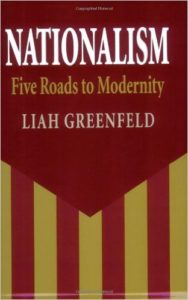 Liah Greenfeld, Nationalism: Five Roads to Modernity (Harvard, 1992). I was impressed when I read this for my dissertation qualifying exams (maybe you read it too [editor’s note: alas no! But I will now]) and I find myself returning to the central idea again and again: that nationalism constitutes modernity. Also significant is her characterization of England as the first nation, and America as the ideal nation. Given resurgent nationalism, this seems timely.
Liah Greenfeld, Nationalism: Five Roads to Modernity (Harvard, 1992). I was impressed when I read this for my dissertation qualifying exams (maybe you read it too [editor’s note: alas no! But I will now]) and I find myself returning to the central idea again and again: that nationalism constitutes modernity. Also significant is her characterization of England as the first nation, and America as the ideal nation. Given resurgent nationalism, this seems timely.
Also God’s Century: Resurgent Religion and Global Politics, by Philpott, et al. And of course, Nigel Biggar’s In Defense of War.
Debra Erickson holds a Ph.D. in Religious Ethics from the University of Chicago. She is co-editor of the forthcoming volume: In Search of the Ethical Polity: Critical Essays on the Work of Jean Bethke Elshtain.
——-
Rebeccah Heinrichs
Churchill’s Trial: Winston Churchill and the Salvation of Free Government, by Larry Arnn
Larry Arnn is the president of Hillsdale College, a well known historian and political philosopher and, more personally, a dear friend of
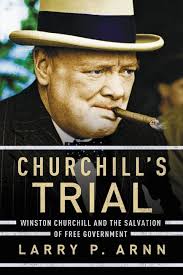 my friend and teacher, the late Peter Schramm, former director of the Ashbrook Scholar Program at my alma mater, Ashland University. I’ve long valued his political courage and insight and so his early and enthusiastic support for Donald J. Trump’s bid for the White House intrigued me. While listening to one of his interviews with Hugh Hewitt, Arnn drew connections between the political intuition of Winston Churchill and Donald Trump, and referenced his book on Churchill. His pitch worked on me. While the reader might remain skeptical of the parallels between Churchill’s proven instincts and Trump’s, who has yet to be inaugurated, he will surely come away with a much greater appreciation of the prudence of one of the greatest statesman of all time. Developing a coherent political ideology is one thing, putting it into practice in a way that honors and protects the sovereignty of the people while promoting liberal ideals is quite another. But we have Churchill as a teacher, and Arnn’s book as a helpful bridge to him. [ed. note: you should also enjoy Arnn’s free online video lectures on Churchill and statesmanship, a part of Hillsdale’s online courses]
my friend and teacher, the late Peter Schramm, former director of the Ashbrook Scholar Program at my alma mater, Ashland University. I’ve long valued his political courage and insight and so his early and enthusiastic support for Donald J. Trump’s bid for the White House intrigued me. While listening to one of his interviews with Hugh Hewitt, Arnn drew connections between the political intuition of Winston Churchill and Donald Trump, and referenced his book on Churchill. His pitch worked on me. While the reader might remain skeptical of the parallels between Churchill’s proven instincts and Trump’s, who has yet to be inaugurated, he will surely come away with a much greater appreciation of the prudence of one of the greatest statesman of all time. Developing a coherent political ideology is one thing, putting it into practice in a way that honors and protects the sovereignty of the people while promoting liberal ideals is quite another. But we have Churchill as a teacher, and Arnn’s book as a helpful bridge to him. [ed. note: you should also enjoy Arnn’s free online video lectures on Churchill and statesmanship, a part of Hillsdale’s online courses]
Downfall: The End of the Imperial Japanese Empire, by Richard Frank
This year President Obama visited Hiroshima, Japan and while falling short of explicitly apologizing for the American decision to drop the bomb, his visit and words were shamefully close. While it certainly makes sense to remember the horrors of Hiroshima, it makes little sense to remember it apart from the context in which it occurred. Frank’s Downfall leads the reader through the battles that culminated in the US decision to drop the bomb. This is a tough, emotional book. But unless we remember the brutality of the Imperial Japanese and their commitment to the war in spite of the war’s anguish and unfathomable bloodshed, we cannot truly appreciate President Truman’s decision to drop the bomb–and end the War. Modern Americans seem not to understand that wars are never ultimately won until the will of the enemy to fight has been utterly eliminated. Downfall reminds us of this hard truth as well as the Bomb’s indispensability to American security.
Washington and Hamilton: The Alliance that Forged America, by Steven Knott & Tony Williams
Where there is a wise, virtuous man, there you will often find a younger, virtuous protégé. And just as the protégé greatly benefits from his teacher, so the teacher is energized and complemented by his protégé. In The Alliance that Forged America, Knott and Williams make a compelling case that President Washington and Alexander Hamilton had this kind of relationship. By the close of the book the reader might determine that not only was Washington the Indispensable Man, but those who have inherited the great constitutional republic established, as Hamilton said “from reflection and choice,” owe the title “Indispensable Alliance” to that of Washington and Hamilton. This book should be added to the library of every student of history and political philosophy.
Rebeccah Heinrichs is a fellow at Hudson Institute. She is also the vice-chairman of the John Hay Initiative’s Counter-proliferation Working Group and the original manager of the House of Representative’s Bi-partisan Missile Defense Caucus. She is a contributing editor at Providence.
——-
James Turner Johnson
William Bain, ed., book Medieval Foundations of International Relations, Routledge, 2016)
James Turner Johnson (Ph.D., Princeton 1968) is Distinguished Professor of Religion emeritus and former Associate of the Graduate Program in Political Science at Rutgers—The State University of New Jersey, where was on the faculty from 1969 through 2015. His research and teaching have focused principally on the historical development and application of the Western and Islamic moral traditions related to war, peace, and the practice of statecraft. Jim is a contributing editor at Providence.
John Kelsay
The Jon Meecham biography of George H.W. Bush, Destiny and Power (Random House, 2015). This is an “official” biography, and one should keep that in mind. Nevertheless, it is of great interest. Meecham represents the 41st President as the last representative of a particular type of U.S. leader. As well, given that George H.W. Bush’s particular engagement with foreign policy, the book’s account of his service at the U.N., as Director of the CIA, and then in connection with Desert Storm and Desert Shiel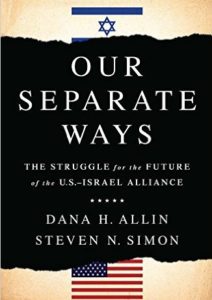 d, sheds light on the way policy is made.
d, sheds light on the way policy is made.
A second recommendation: Flagg Miller, The Audacious Ascetic (Oxford, 2015) is a fascinating analysis of the career of Usama bin Ladin. Based on the author’s work with a cache of audiocassettes captured by U.S. forces operating in Afghanistan, the book sheds light on bin Ladin’s aims, his views of the United States and allied countries, and on the future of the jihadist movement.
Also: Dana Allin and Steven Simon, Our Separate Ways: The Struggle for the Future of the U.S.-Israel Alliance (Public Affairs, 2016) takes up the way changing demographics, economics and religious trends affect the relationship between the United States and Israel. The authors’ recommendations will be of interest as the new administration begins to define its foreign policy, especially with respect to the Middle East.
John Kelsay is Distinguished Research Professor at Florida State University. His many books include, Arguing the Just War in Islam.
——-
Chris Kolakowski
American Caesar by William Manchester: Still a classic, although a bit dated. Douglas MacArthur is critical to understanding modern Asia and America’s place in in the Pacific today. This is among the most accessible one-volume biographies of the general available.
Forgo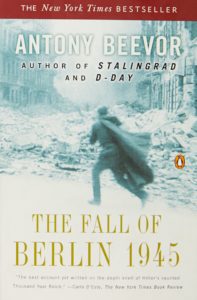 tten Armies: The Fall of British Asia by Christopher Bayly and Tim Harper: This book examines Southeast Asia from 1941-45 through a lens of social, military, racial, and political factors as they play out against the backdrop of Japanese and British offensives and counteroffensives. The British may have won back what they lost at war’s start, but the Japanese victories had kindled nascent independence movements that soon ended the British Empire in the East. These stories are important parts of national identities in the region today.
tten Armies: The Fall of British Asia by Christopher Bayly and Tim Harper: This book examines Southeast Asia from 1941-45 through a lens of social, military, racial, and political factors as they play out against the backdrop of Japanese and British offensives and counteroffensives. The British may have won back what they lost at war’s start, but the Japanese victories had kindled nascent independence movements that soon ended the British Empire in the East. These stories are important parts of national identities in the region today.
Berlin 1945 by Antony Beevor. This is a well-written and searing account of the end of World War II in Germany. It examines political, personal, and military factors in the defeat of Hitler and the beginning of the Cold War. The scars of these events are still present in Europe today.
Christopher Kolakowski is the Director of The General Douglas MacArthur Memorial in Norfolk, Virginia. He is the author of numerous books, including several on the civil war and, most recently, Last Stand on Bataan: The Defense of the Philippines, December 1941-May 1942
——-
Marc LiVecche
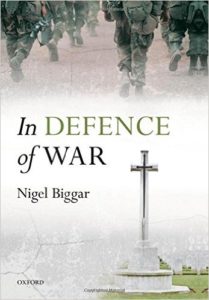 A few of my own recommendations have already been put forward, and I’ll not duplicate them here, with one slight exception. Debra Erickson mentioned Nigel Biggar’s In Defence of War, somewhat in passing. I want simply to underline her recommendation lest anyone think she suggested it merely as an after thought rather than an obvious aside. Debra and I (along with Dan Strand and Lubomir Ondrasek–each featured below) were blessed and privileged to have enjoyed Jean Bethke Elshtain as our doctoral supervisor. Jean died a couple months before IDoW was published but she always commended Nigel’s earlier scholarship on war–including his work on the nexus of war and reconciliation. IDoW features some of his most developed writing on the subject and is among the very top books on just war and military ethics to release since Paul Ramsey’s revolutionary War and the Christian Conscience and The Just War: Force and Political Responsibility. Like Elshtain, Biggar peppers his conceptual arguments with references to popular literature and film and with historic cases–including combat narrative. Taken together, all this renders incredibly nuanced and complex thoughts highly readable.
A few of my own recommendations have already been put forward, and I’ll not duplicate them here, with one slight exception. Debra Erickson mentioned Nigel Biggar’s In Defence of War, somewhat in passing. I want simply to underline her recommendation lest anyone think she suggested it merely as an after thought rather than an obvious aside. Debra and I (along with Dan Strand and Lubomir Ondrasek–each featured below) were blessed and privileged to have enjoyed Jean Bethke Elshtain as our doctoral supervisor. Jean died a couple months before IDoW was published but she always commended Nigel’s earlier scholarship on war–including his work on the nexus of war and reconciliation. IDoW features some of his most developed writing on the subject and is among the very top books on just war and military ethics to release since Paul Ramsey’s revolutionary War and the Christian Conscience and The Just War: Force and Political Responsibility. Like Elshtain, Biggar peppers his conceptual arguments with references to popular literature and film and with historic cases–including combat narrative. Taken together, all this renders incredibly nuanced and complex thoughts highly readable.
A second volume on military ethics that everyone should read is The Ashgate Research Companion to Military Ethics, edited by Providence contributing editors Eric Patterson and James Turner Johnson. I only hesitate to put it on the list because you’ll have to mortgage your home or sell a kidney to get a copy. But it’s probably worth the kidney–with essays by many of the contributors to this list and to Providence, you’ll find familiar writers at their very best. With up-to-date essays exploring when to go to war, how to fight it once you’re there, ethics after conflict, and martial ethics across various cultures, it’s a brilliant guide for students and established scholars alike. If nothing else, get your library to order it and renew it constantly. Alternatively, the Kindle version will…er…save you a few bucks.
Three good books to go along with Paul Miller’s American Power & Liberal Order (recommended below) and Henry Nau’s Conservative Internationalism (recommended above) are Bret Stephens’ America in Retreat: The New Isolationism and the Coming Global Disorder, Anne Pierce’s A Perlious Path, and Colin Dueck’s The Obama Doctrine: American Grand Strategy Today. Each book discredits the idea that “America first” needs to manifest in a retreat from global responsibility, and argues instead for American leadership exercised with prudence, and within limits.
For a somewhat lighter but no less rollicking good read, try Brian Kilmeade’s Thomas Jefferson and the Tripoli Pirates. It is another example, from an earlier era, of the need for power to protect all manner of national goods and to deter (or defeat) those who would try to take them.
Both Karl Marlante’s What It Is Like To Go To War and Phil Klay’s Redeployment are two essential reads for anyone wanting to grapple with the moral conditions of war and the coming home of warfighters. Marlante’s book is a reflection on his own combat experience in Vietnam (retold in novel form in Matterhorn) and Klay’s is a shortstory collection drawn from his own and other’s experiences in the War on Terror.
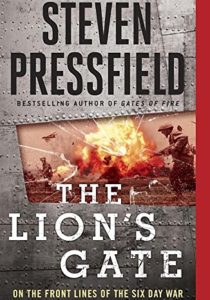 Lastly, two great books by Steven Pressfield. The Lion’s Gate is a “hybrid history” of Israel’s Six Day War. Extensively research and making use of interview and memoir, Pressfield gives dramatic presentation to the historic record of the remarkable, even miraculous, Israeli victory. Secondly, The Afghan Campaign is a fictionalized account of Alexander the Greats’ conquest of Afghanistan. If even remotely accurate, the book is essential for anyone wanting to understand what our warfighters have faced in fighting in that part of the world. It also proves that insurgency warfare and the conditions of combat in this War on Terror are nothing new. As General Mattis said of the present-day fight in Afghanistan, “None of this would have surprised Alexander the Great.” That it did in fact surprised too many in key positions of American leadership only shows that Americans really do need to read more.
Lastly, two great books by Steven Pressfield. The Lion’s Gate is a “hybrid history” of Israel’s Six Day War. Extensively research and making use of interview and memoir, Pressfield gives dramatic presentation to the historic record of the remarkable, even miraculous, Israeli victory. Secondly, The Afghan Campaign is a fictionalized account of Alexander the Greats’ conquest of Afghanistan. If even remotely accurate, the book is essential for anyone wanting to understand what our warfighters have faced in fighting in that part of the world. It also proves that insurgency warfare and the conditions of combat in this War on Terror are nothing new. As General Mattis said of the present-day fight in Afghanistan, “None of this would have surprised Alexander the Great.” That it did in fact surprised too many in key positions of American leadership only shows that Americans really do need to read more.
——-
Timothy Mallard
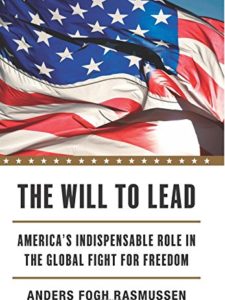 Anders Fogh Rasmussen’s new book The Will to Lead. Well-written and timely given the coming shifts in American Foreign Policy.
Anders Fogh Rasmussen’s new book The Will to Lead. Well-written and timely given the coming shifts in American Foreign Policy.
Ferdinand Schlingensiepen’s outstanding shorter biography: Dietrich Bonhoeffer, 1906-1945: Martyr, Thinker, Man of Resistance A corrective to both Eric Metaxas’ and Charles Marsh’s less-considered efforts.
Timothy Mallard is a chaplain (Colonel) in the United States Army. He is a contributing editor at Providence.
——-
Gerald McDermott
Benny Morris, One State, Two States. The best short history of the last few decades of the Israeli-Palestinian conflict from the best Israeli “New Historian”.
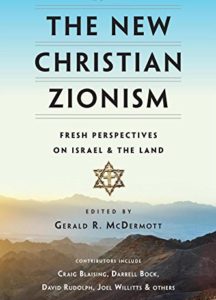 Gerald McDermott, ed., The New Christian Zionism: Fresh Perspectives on Israel and the Land. A whole new approach from a team of scholars on how how to understand Israel theologically. I know, I know, this is shameless. [ed. Note: Hey, if you didn’t mention the book, we would have!]
Gerald McDermott, ed., The New Christian Zionism: Fresh Perspectives on Israel and the Land. A whole new approach from a team of scholars on how how to understand Israel theologically. I know, I know, this is shameless. [ed. Note: Hey, if you didn’t mention the book, we would have!]
Gerald R. McDermott is Anglican Chair of Divinity Beeson Divinity School. He has authored, co-authored, or edited over eighteen books, including Jonathan Edwards Confronts the Gods (and, well, The New Christian Zionism! ).
——-
Bryan McGraw
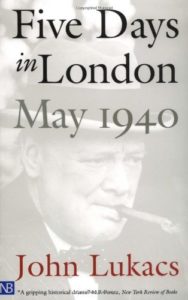 I’m terrible at recommending books, but one I always do is John Lukacs’ Five Days in London, about the five days in May 1940, when the Brits were about to lose their army at Dunkirk and the cabinet was about to sue for peace. Churchill saves western civilization and the fishing fleet saves the army. Absolutely great stuff!
I’m terrible at recommending books, but one I always do is John Lukacs’ Five Days in London, about the five days in May 1940, when the Brits were about to lose their army at Dunkirk and the cabinet was about to sue for peace. Churchill saves western civilization and the fishing fleet saves the army. Absolutely great stuff!
Bryan McGraw is Associate Professor of politics at Wheaton College, IL. His research includes political theory and perfecting pulled pork BBQ sandwiches. He is the author of Faith in Politics: Religion and Liberal Political Thought. He is better at book recommendations than he lets on.
——-
Paul Miller
Well, you know I have to answer that there is only one book for Christians interested in foreign policy:
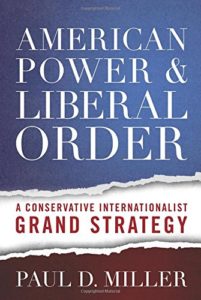 American Power & Liberal Order, by Paul Miller. [Ed. Note: Hey, sometimes we have to write the books that need to be written. And this book ought not only to have been written but ought to be recommended to read. It forms the basis for our own “A Christian Declaration on American Foreign Policy” and cannot be commended highly enough. So there!]
American Power & Liberal Order, by Paul Miller. [Ed. Note: Hey, sometimes we have to write the books that need to be written. And this book ought not only to have been written but ought to be recommended to read. It forms the basis for our own “A Christian Declaration on American Foreign Policy” and cannot be commended highly enough. So there!]
But let’s say that doesn’t count. What else might I recommend?
- The World America Made, by Robert Kagan. Good overview of the current moment, America’s role in the world, our historic position, and why liberal order matters.
- Reinhold Niebuhr, either The Irony of American History, or Children of Light and Children of Darkness. After reflecting on our position in the world historically, spend some time with Niebuhr to reflect on it ethically and, even, theologically. Niebuhr is a must for anyone who wants to think about the rights and wrongs of American power.
- God and Gold, by Walter Russell Mead. Far bigger, denser, weirder, and more ambitious than Kagan’s book, this is Mead’s magnum opus. It is a philosophy of history, a defense of the Anglo-American tradition, a philosophical treatise, a moral foundation of capitalism, and a lot more.
- Special Providence, by Walter Russell Mead. More accessible and more popular, this was Mead’s first book and it redefined the conversation about America’s foreign policy intellectual traditions.
- Promised Land, Crusader State, by Walter McDougall. A slightly more conventional take on America’s foreign policy history, McDougall clearly doesn’t like the path American foreign policy has taken since World War I. Nonetheless, he’s a good historian and writes a compelling narrative, until he goes off the rails in the final two chapters. Ignore them.
- Dangerous Nation, by Robert Kagan. For a different take on the first century of American foreign policy, try Kagan’s first volume in a projected two- or three-volume history. This goes from the Founding through the Spanish-American War, and Kagan finds far less isolationism and far more liberalism than McDougall.
- Liberal Leviathan, by John Ikenberry. This is dense, but it’s Ikenberry’s sustained argument that liberal order matters; that the US plays a key role in creating it; and that we can also play a key role in dismantling it.
Aside from foreign policy, here are a few more [Ed. Note: While—perhaps—outside the immediate scope of this list, I’m keeping the following recommendations in for two reasons: 1) It is such a great list that “I would sooner destroy a stained glass window” than delete one of these titles, and 2) To read from this list will, I have no doubt, prove the idea that before one can be a great thinker about foreign policy, they simply must first be a great thinker. Each of these will help]:
- The Rise of Theodore Roosevelt, by Edmund Morris. One of the greatest books ever written in English.
- The Great Divorce, by CS Lewis.
- The Abolition of Man, by CS Lewis
- After Virtue, by Alasdair MacIntyre
- The Mind of the Maker, by Dorthy Sayers
- The Fractured Republic, by Yuval Levin
- To Change the World, by James Davidson Hunter
- Political Church, by Jonathan Leeman
Paul Miller is associate director at the Clements Center for National Security at the University of Texas at Austin. He is a contributing editor at Providence and author of the widely recommended—and handsomely bound—American Power & Liberal Order.
——-
Robert Nicholson
Christ and Crisis, A Short and sweet meditation on the nexus between the church and international order from Lebanese philosopher and statesman Charles Malik. Drawn from a life spent contemplating the relationship between matters of spirit and flesh. Sure to satisfy the thirsty soul.
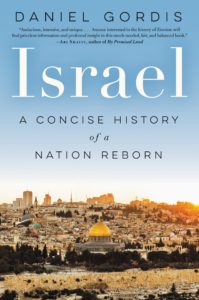 Israel: A Concise History of a Nation Reborn, by Daniel Gordis. Possibly the best single volume history of the Jewish state that I’ve ever read. Artfully combines the miraculous and the tragic in the broad sweep of history, all while transcending the typical black boxes to expose the real-life human beings living inside. Masterfully done.
Israel: A Concise History of a Nation Reborn, by Daniel Gordis. Possibly the best single volume history of the Jewish state that I’ve ever read. Artfully combines the miraculous and the tragic in the broad sweep of history, all while transcending the typical black boxes to expose the real-life human beings living inside. Masterfully done.
Islamic Exceptionalism: How the Struggle over Islam is Reshaping the World, Shadi Hamid. Required reading for anyone trying to comprehend the complex, deep-seated, and fast-paced transformation that is rocking the Middle East in our lifetime. Hamid writes with discernment, compassion, and a knack for the human story that does justice to the 2 billion people who claim Islam as well as everyone else who is trying to figure out what the heck is going on.
Robert Nicholson is president of Philos Project and co-publisher of Providence.
——-
Lubomir Martin Ondrasek
Michael Zantovsky: Havel: A Life (2014)
Jean Bethke Elshtain: Democracy on Trial (1995)
Robin W. Lovin: Christian Realism and the New Realities (2008)
Lubomir Martin Ondrasek is the president and co-founder of Acta Sanctorum, a Chicago-based Christian non-profit that works for positive transformation in post-communist Central and Eastern Europe.
——-
Impossible People – Christian Courage and the Struggle for the Soul of Civilization, Os Guinness — InterVarsity Press
Bonhoeffer – Pastor, Martyr, Prophet, Spy, Eric Metaxas — Thomas Nelson Inc.
Liberty and Tyranny, A Conservative Manifesto, Mark R. Levin — Threshhold Editions
David Shedd is a national security consultant, a visiting distinguished fellow in the Heritage Foundation’s Davis Institute for National Security and Foreign Policy, and adjunct professor at Patrick Henry College. Prior to this, he retired from government service after nearly 33 years. He held a variety of top level positions in the U.S. intelligence community, including as acting director of the Defense Intelligence Agency.
——-
Daniel Strand
Special Providence: American Foreign Policy and How it Changed the World, Walter Russell Mead. Mead is a leading light of American foreign policy who manages to combine careful thought, historical depth, and wisdom in all of his work. Special Providence is a great intro to American foreign policy history.
Beyond Radical Secularism: How France and the Christian West Should Respond to the Islamic Challenge, Pierre Manent. Written by one of the most astute political theorists in Continental Europe, this takes up the timely issue of secularism and Islamic terrorism offering a subtle and nuanced Christian response to this seemingly intractable problem.
Medieval Europe, by Chris Wickham. Wickham is the Chichele Professor of Medieval History at Oxford University and the best medievalist of our day. Americans have a woeful understanding of the past and this book could go a long way to opening the storehouse of Medieval Europe to the interested reader. Wickham writes in an accessible and engaging style that makes it both enjoyable and informative.
Daniel Strand is a postdoctoral fellow in the Center for Political Thought and Leadership at the Arizona State University. His scholarly interests are in history of political thought, religion and politics, and the thought of St. Augustine of Hippo.
——-
Tim and Kathy Keller, The Songs of Jesus: A Year of Daily Devotions in the Psalms. Because the Psalms are the gymnasium of the soul, as Ambrose said.
Phyllis Tickle, The Divine Hours (Pocket Edition). Prayer is paradigmatic for practice – also political practice. Also: stuffs easily into pocket, as its name suggests, for when traveling abroad.
Louis Walinsky (ed.), Agrarian Reform as Unfinished Business: The Selected Papers of Wolf Ladejinski. Because the world needs more Ladejinskis, because of his “abiding intolerance of avoidable poverty,” and because “he rarely reported good news and never succumbed to the self-adulation prevalent among even the most enlightened of bureaucracies.” (Quotes from the Foreword.)
Gideon Strauss is Associate Professor of Worldview Studies at the Institute for Christian Studies and commutes between Montreal, Toronto, and Cape Town.
——-
Kevin Stringer
Prit Buttar, Battleground Prussia: The Assault on Germany’s Eastern Front 1944-45
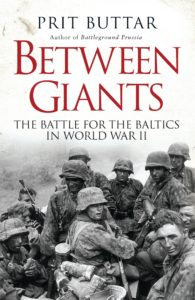 Prit Buttar, Between Giants: The Battle of the Baltics
Prit Buttar, Between Giants: The Battle of the Baltics
Kevin Stringer is a Fellow at the Center for the Study of Civil-Military Operations at West Point and Lieutenant Colonel in the U.S. Army Reserve.
—
Image credit: Santa Claus, portrayed by event coordinator Dick McCallum, rides alongside Sgt. Daniel M. Iversen in a CH-46 helicopter en route to the remote village of the Havasupai tribe in order to deliver Christmas gifts to children as part of the Toys for Tots program on Dec. 16, 2009. Iversen, a 31-year-old native of Torrance, Calif., was one of seven Marine reservists from the Phoenix-based Environmental Services Detachment who escorted Santa. Marine Medium Helicopter Squadron 764, a reserve unit based at Edwards Air Force Base north of Los Angeles, has flown toys to the village’s children for Christmas as part of the Toys for Tots program for the past 14 years. (this Image was released by the United States Marine Corps) wikimedia commons
